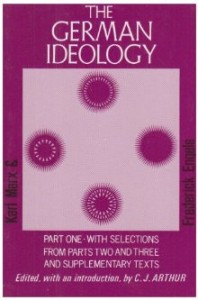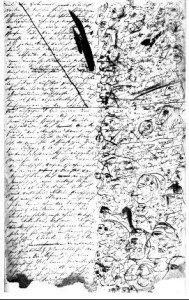Some thoughts on the German Ideology and Marx’s “Method.”
What most struck me about The German Ideology and the comments regarding On the Jewish Question is how much Marx’s interest in political economy was at least partly provoked by questions or (better put) by a critique of the state—specifically, the state as ideology. And his critique of state ideology will actually help me tie in other readings on the more general topic of Marx’s Dialectical Method.
The book sets out to critique the German Idealists, while providing Marx and Engel’s alternative: a materialist conception of history. The change they are calling for has clear implications for then-prevailing and still-relevant debates about the state. Hegel conceived of the state as representing the objectification of Absolute Spirit and Reason. He saw the state as a guarantor of freedom by its mediation of the private interests and unbridled desires of individuals in civil society—ideas it seems he adapted from Adam Smith. Approaching this problem from an Idealist standpoint, the Young Hegelians critiqued religion for its de-politicization of civil society and for widening the conceptual divorce between state and civil society.
But the Young Hegelian critique could attain no further achievement than what Marx and Engels deride as “mere” political emancipation, which leaves more robust “human emancipation” thoroughly shackled. Why? Because according to Marx and Engels, the Young Hegelians failed to recognize the material bases of social power, which are produced through a historically situated mode of production made by the real lives of real people. The constitutional liberal regimes of their time and the history of the French Revolution showed to Marx and Engels how equality, fraternity, property, and security inevitably reinforced the atomization and self-interest that motor individuals around “civil society” under the veiled trappings of liberty and freedom. Through the myopic protection of these personal “liberties”—e.g. private property—the state absolves itself of the injustice and un-freedoms that these liberties inevitably produce through society’s material relations.
 What’s worse, say Marx and Engels, not only do the German Idealists fail to recognize their own philosophical project as a product of the material conditions of their time and place, the German Ideology is in fact complicit in obscuring and justifying the social relations being spurred by the then-burgeoning mode of production and the consequent growing abstraction of the state. The ideologically driven separation between civil society and the state can thus be seen as a necessary abstraction for perpetuating the material/social relations of capitalism and the unquestioned authority of the state—two moves that are actually different parts of a complex whole. Dialectics!
What’s worse, say Marx and Engels, not only do the German Idealists fail to recognize their own philosophical project as a product of the material conditions of their time and place, the German Ideology is in fact complicit in obscuring and justifying the social relations being spurred by the then-burgeoning mode of production and the consequent growing abstraction of the state. The ideologically driven separation between civil society and the state can thus be seen as a necessary abstraction for perpetuating the material/social relations of capitalism and the unquestioned authority of the state—two moves that are actually different parts of a complex whole. Dialectics!
And here’s where it gets complicated, because it’s not a facile argument about the economic base or structure mechanistically determining the superstructure (ideology or, for my concerns, the state). The state itself is abstracted and reified through the process of capitalist production/expansion in the same way that individuals begin to see themselves as autonomous beings in a process that is, paradoxically, fundamentally collective—i.e. capitalism. This is not to say, “There is no state as an institutional structure.” Rather, as Derek Sayer puts it: “It is the reality of their apparent separation from capitalism’s ‘economic structure’—its essential relations—which is at issue” (Violence of Abstraction, 109). Marx’s dialectical method requires us to not only examine how the two—mode of production and the state—are produced in mutual interaction as part of a complexly structured whole; it also means we have to dig beneath their commonsesnsical, mystified appearance as autonomous fields.
Here lies the danger (or violence) of abstraction in my own research and a fatal flaw of Althusserian approaches, if taken to an extreme. Abstraction in this sense becomes a process of over-individuation, in which our conceptual categories become fixed and ossified; they start to stand in for and obscure actual concrete processes. For example, one instance (e.g. the economy—or production) can’t intervene or absolutely determine another instance (e.g. the state—or consumption) if these are understood as co-constitutive and inter-mediated. This is one reason why Marx was so diligent about critiquing the conceptual vocabulary and categories of the classical political economists—and Hegel—while simultaneously presenting a more adequate theory of how capitalism actually works.
As Stuart Hall notes in his reading of the 1857 Introduction, Marx’s dialectical method is not only a critique that reveals hidden relations. “It is a critique of a certain distinctive kind – one which not only lays bare the ‘real relations’ behind their ‘phenomenal forms’, but does so in a way which also reveals as a contradictory and antagonistic necessary content what, on the surface of the system, appears only as a ‘phenomenal form’, functional to its self-expansion” (141). Critique in Marx’s hands is a triple move: 1) it’s about how capitalist political economy “really works,” 2) how it’s represented theoretically and commonsensically, 3) as well as about its internal contradictions, its limits, and, ultimately, its transcendence (Hall 141).
Marx, Karl and Friedrich Engels. 1998 [1846]. The German Ideology. New York: Prometheus.
Sayer, Derek. 1987. The Violence of Abstraction. Oxford: Blackwell.
Hall, Stuart. 2003. “Marx’s Notes on Method: A ‘Reading’ of the ‘1857 Introduction’,” Cultural Studies 17(2): 113-149.


Pingback: The Violence of Abstraction | Territorial Masquerades
Pingback: Lefebvre, Fetish, Critique | Territorial Masquerades
Pingback: Guha: Dominance Without Hegemony? | Territorial Masquerades
Pingback: Marx: Debates on Law on Thefts of Wood | Territorial Masquerades